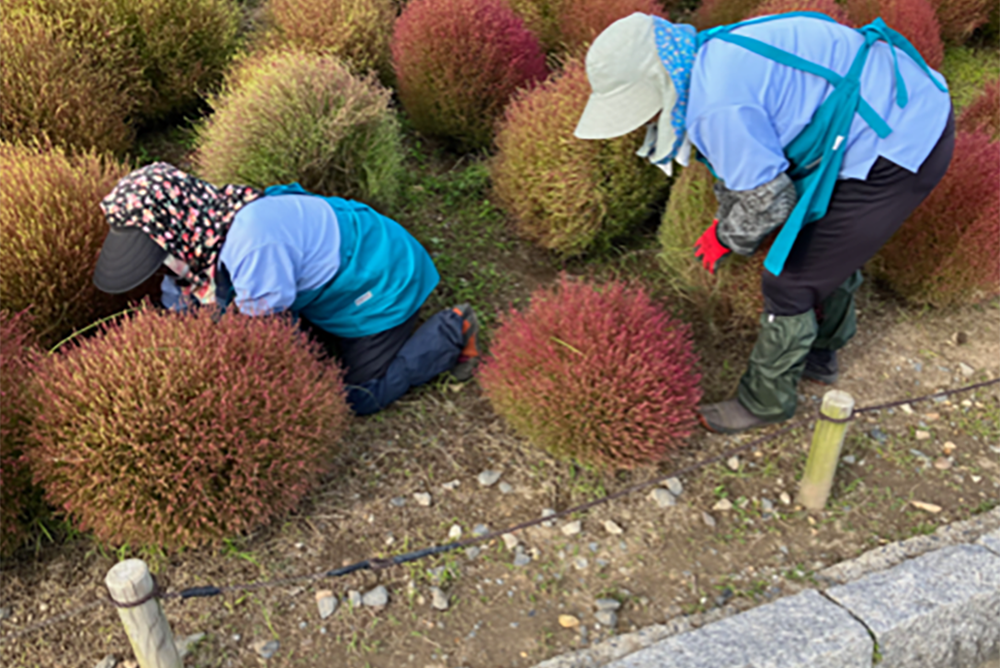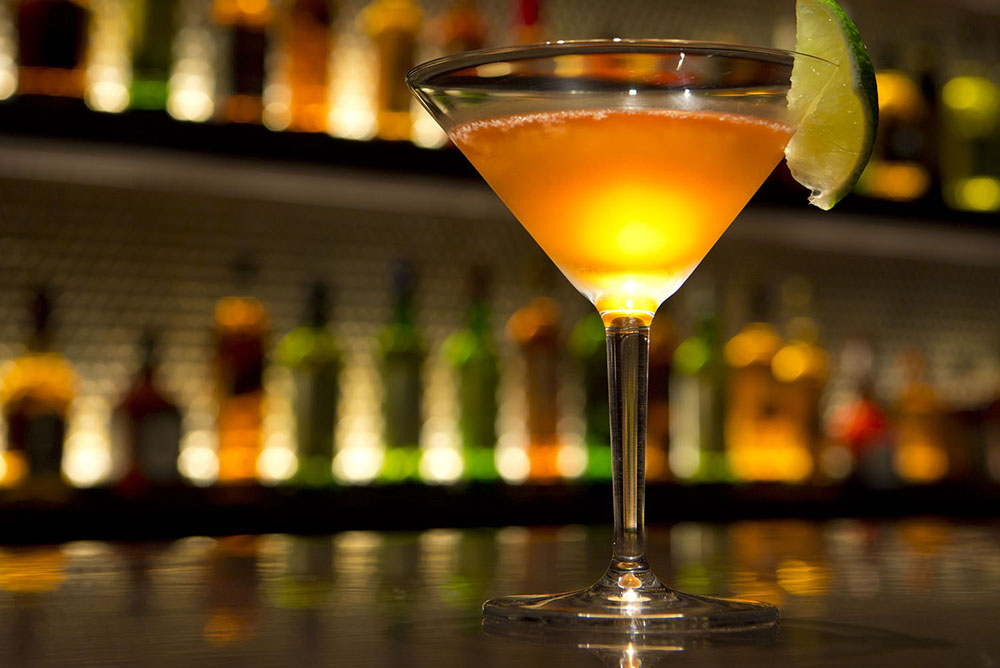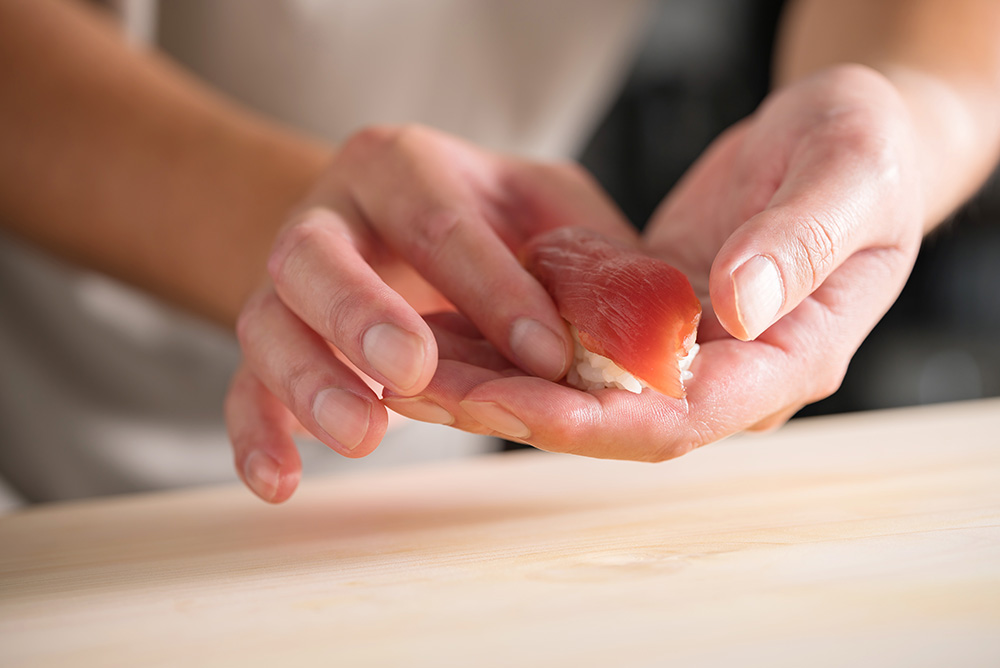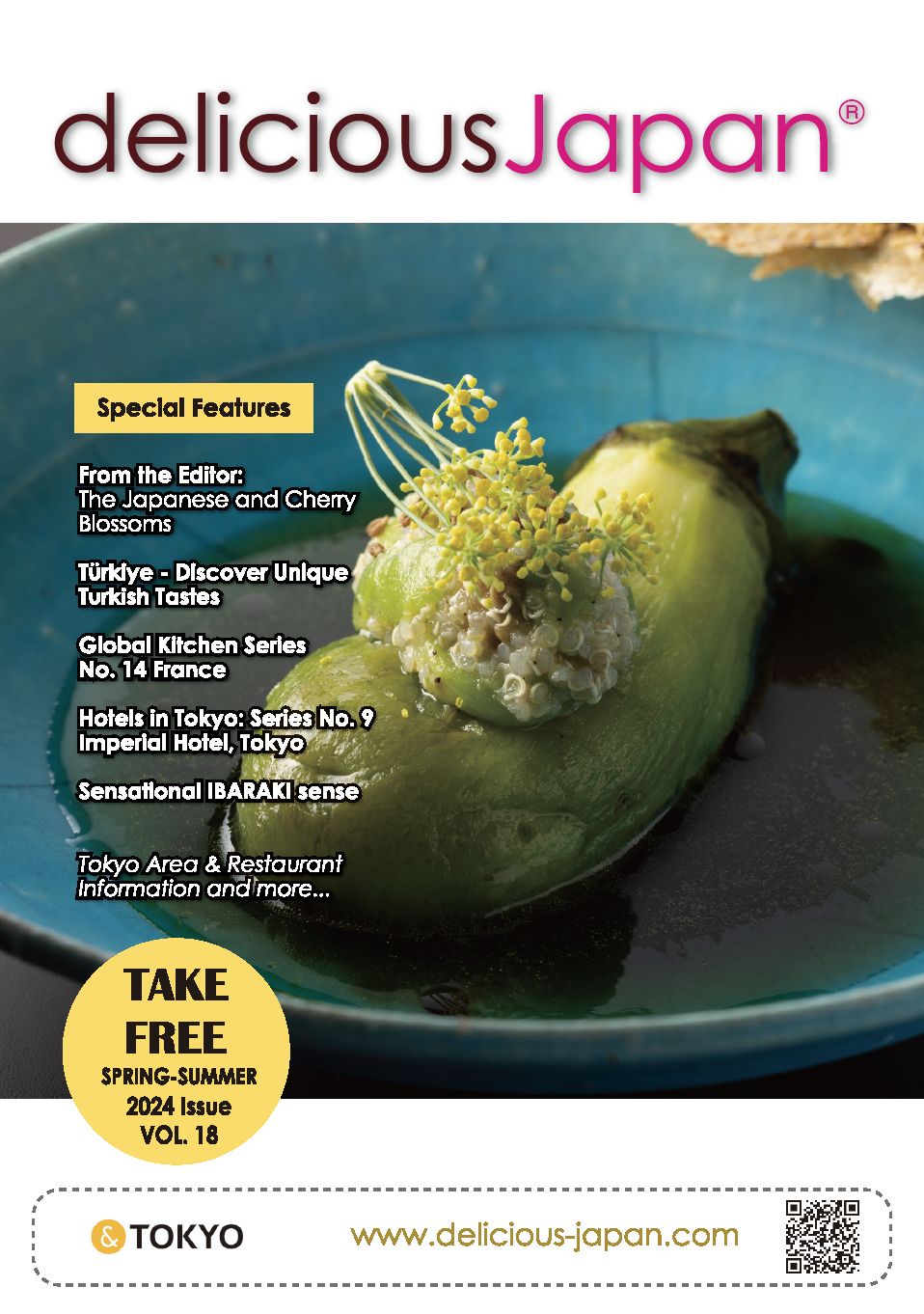
The Prince Gallery Tokyo Kioicho, a Luxury Collection Hotel
Towards the Infinite Creation of New Washoku
Executive Chef Ken Takahashi’s Challenge and Passion
 Ken TAKAHASHI
Ken TAKAHASHIExecutive Chef, The Prince Gallery Tokyo Kioicho, a Luxury Collection Hotel
When the WASHOKU restaurant Souten first opened, it was really a series of challenges.
Souten is the main dining room serving WASHOKU, and its concept is "ice," which reflects the idea of sealing in the freshness of seasonal ingredients and delivering them to the customers. While adhering to the basics of WASHOKU, we have pursued a new style of cooking, keeping Japanese, Western, Chinese, and European cuisines in mind. The emphasis is on freshness and uniqueness based on its "ice" concept. While maintaining the base Japanese elements such as bonito broth, soy sauce, and miso, we have added other culinary influences to create a new WASHOKU style that can only be enjoyed here. The menu changes every three months, for spring, summer, fall, and winter, to provide an ever-evolving cuisine. I think our strength is that we are able to offer a style of WASHOKU that can only be found here, as well as dishes with the essence of other countries.
At the 2018 Culinary Safari, we had a slight glitch when we did not get the ingredients and seasonings we had requested in advance, but at the subsequent Tokyo Week 2023 in Milan, we were able to get to know the local chefs and draw their attention to Japanese food culture. A dish of buckwheat noodles served in a cocktail glass and topped with tempura was very popular. The following year, the 2024 Fair was also a success, and I believe that WASHOKU was accepted and enjoyed by local customers as a new experience.
Among the many questions asked locally were how to make mochi rice, wagyu beef sandwiches, and hand-rolled sushi. Serving Japanese food in Milan was very significant as a cultural exchange, and was a great learning experience and confidence boost for our staff. Staff members improved their skills and motivation through interaction with chefs from other countries, which also boosted the hotel's confidence.
First of all, we want them to enjoy cuisine that they can only find here. My experience at this hotel is what raised me, and I want to repay that debt by giving guests a sense of who I really am. Kobe beef is especially popular among overseas customers, and we finally started offering it last month, partly because we received many requests for it. From the teppanyaki counter seats, guests can also enjoy the beautiful night view of Tokyo.
In addition, the hotel offers new experiences called “IMMERSIVE DINING.” I devised these entirely from scratch, including the utensils, food, and digital art, and the "JAPONISM" and "STELLA" courses are particularly suitable for international guests. For JAPONISM, Fuji and fireworks are projected to give a true feeling of the beauty of Japan. We have paid attention to every detail, including a new set of tableware for this purpose, so we really hope guests will experience it for themselves.
Our mission is to move our customers emotionally. It is also linked to the hotel's overall "Connect to your future" sustainability-conscious philosophy. In particular, collaborating with digital art is a new challenge for me, and I am happy to be able to bring surprise and delight to our customers.
We create products that fit our marketing concept while focusing on the management perspective. The IMMERSIVE DINING experiences I just mentioned, using digital art, are one example. Based on ideas from the marketing side, we are able to develop and promote our products to provide unique experiences. We are constantly introducing new ideas, such as seasonal menus and afternoon teas. For example, when we proposed cube shapes for afternoon tea, going beyond the traditional boundaries of round shapes and small items, the result was even more creative than expected. We value this flexible approach.
Please tell us about your vegan and halal offerings at The Prince Gallery Tokyo Kioicho.We do not have a dedicated kitchen that is completely halal, but we can accommodate people who want halal as long as they do not require that level of separation. We actively work to incorporate vegan and plant-based menu items, and our Western restaurants offers vegan courses. The WASHOKU restaurant Souten can also support those needs if diners give us some time. Plant-based menus are also available for sushi and afternoon tea, so we are able to flexibly accommodate diverse dietary restrictions. If diners make a request in advance, we will do our best to cater to their needs.
It is said that "encountering good ingredients" is important in cooking. Do you sometimes go in person to production regions around Japan?I do not go directly to domestic production regions. The hotel has an established purchasing system and selects and procures safe and trusted ingredients. When we come across good ingredients overseas, we can consult with the Purchasing Department and purchase them through an inspection process. Procurement of food ingredients is done properly in accordance with the company's safety and security rules.
What is your vision for the future as head chef of The Prince Gallery Tokyo Kioicho?I’m looking to give back to our staff. I would not be where I am today without the staff I have worked with, so it is important to nurture them and give them experience. I also want the next generation to be able to experience the joy I feel when a customer is pleased with a dish I have conceived. My goal is to come up with handwritten menus, pass that style on to my staff, and train them as head chefs. The style I learned from my own master is the foundation of my own style, and I want to pass that teaching on to my successors.
What does hospitality mean to you?I believe that hospitality means giving diners surprises and excitement. My goal is to make our international clients say “that’s amazing,” and I am committed to providing a special day for our domestic diners as well. I strive to create dishes, tableware, and presentations that allow diners to enjoy not only the food, but the entire experience of visiting the restaurant. I believe that the essence of hospitality is to provide an experience that our guests will remember long after they leave.

Hospitality is Delivering Comfort Beyond Expectations
 Shinobu MOMOI
Shinobu MOMOIExecutive Concierge, The Prince Gallery Tokyo Kioicho, a Luxury Collection Hotel
The main attraction of The Prince Gallery Tokyo Kioicho is the spectacular views that can be enjoyed from every room in the hotel. The south side overlooks Tokyo Tower and Tokyo Bay, the east side the Tokyo Sky Tree and the Imperial Palace, the west side Mt. Fuji and the Akasaka Imperial Palace, and the north side Ikebukuro and Shinjuku. Every direction offers beautiful views that vary with the time of day. The hotel's design also incorporates art and a sense of floating, especially in the fact that the views can be enjoyed like a painting from the daybeds in the guest rooms. While the quiet environment allows for peace and tranquility, it is also conveniently located for easy access to the center of Tokyo.
What makes The Prince Gallery Tokyo Kioicho a "gallery" is its artistic design. The rooms are designed without chairs or sofas, with daybeds placed next to the windows, and mirrors used below the daybeds to create a sense of floating. That allows the view to be enjoyed like a painting from within the room. The scenery changes over time, offering the beauty of sunrise in the morning and orange hues at sunset. Many guests wake up early in the morning to open the curtains and enjoy the sunrise, or spend the time relaxing in the spa.
We hope that our international guests will enjoy interacting with our warm-hearted Japanese staff amid the hotel’s European atmosphere. The "Gallery Experience" also offers programs to experience Japanese culture, such as art tour by hotel staff, an authentic tea ceremony experience in the tea room with a view, and a tour of the Akasaka Prince Classic House. Recently, the hotel itself has become a travel destination, and we are enhancing these programs to enhance the value of the guest experience. The concierge also serves to make each guest’s stay more special by providing personalized tour guidance. One of the hotel's strengths is that the concierges are flexible and responsive to guests' interests and provide service to suit the occasion.
Please tell us about any particularly memorable or enjoyable events you have experienced as a concierge.The most memorable events for me as a concierge were experiences during the pandemic. I kept in regular touch with a guest who had been unable to return home during the lockdown, sharing information about the situation in the city and changes in things like flowers in the garden. When that guest client returned in 2022, he told us, "I have missed you guys for the past three years," which made us very happy. I was once asked by a guest to search for someone, and as a result of gathering information through various means, I was able to successfully find the person they were looking for. It’s moments like these that make me realize the value of my work as a concierge.
On the other hand, what were some of the struggles or challenges you’ve faced as a concierge?One of the difficulties I have had as a concierge is adjusting to the differences in culture and customs between overseas guests and Japan. In Japan, in particular, punctuality and certainty of appointments are considered very important, and that can create a gap with foreign sensibilities. To avoid discomfort on both sides, we try to explain Japanese culture to our customers in advance and make sure they understand it. We need to re-establish relationships that were once severed by the pandemic, and we find it difficult to get people to understand the cultural differences again.
I believe that the role of concierge is now receiving more attention and importance than ever before. Is the scope of concierge services expanding beyond hotel information and restaurant/ticket arrangements?The concierge's role is not limited to traditional hotel information and arrangement services, but now delivers a much broader range of services. In particular, we are increasingly working to find and introduce to our clients not only tourist attractions, but also the areas around those attractions, and new places to visit. Concierges are expected to find attractive local places and work with colleagues in other regions to provide new experiences. We also play the role of travel agent, arranging everything from transportation to lodging and meals in the guest's travel plans. We feel that we are contributing to the revitalization of tourism by communicating the attractions of resort areas, and we are conscious of gathering new landmarks and information when we travel.
Do you have regular opportunities for information exchange and training among concierges?Information exchange and training is a daily routine for concierges. We use social media to share information on new stores and events, and hold regular monthly meetings at the Japan Concierge Association and Les Clefs d’Or, inviting lecturers for talks and holding discussions. Another strength is that concierges cooperate with colleagues in other hotel chains, enabling smooth collaboration even when guests stay at other hotels.
What is your vision for the future as chief concierge?My vision for the future as Chief Concierge focuses on training the next generation and strengthening our team. We would like to build a foundation through study and training so that we can enhance our individual abilities and demonstrate our strength as a team as a whole, and then entrust the next step to the next generation. Concierges not only provide services within the hotel, but also collaborate with outside parties to increase the number of visitors to Japan, with the concierges taking on the role of promoting the attractions of Japan as a whole. I felt the presence of concierges as a student, and through the Great East Japan Earthquake and the pandemic, I recognized the importance of looking beyond our hotels to the rest of Japan, so I hope to fulfill our mission as ambassadors for Japan's attractions.
How many concierges does your hotel have now?Currently, the hotel has six concierges. The warmth of the staff and their excellent customer service have been highly praised by both domestic and international guests, especially for the smiles and welcoming hospitality of the staff. The concierge greets guests face to face with a smile as they enter the hotel, and after the pandemic period, I am reminded that "the guests are what makes the hotel". The presence of guests creates a lively atmosphere in the hotel, and drives the staff to smile and improve their service.
What does true hospitality mean to you?To me, true hospitality goes beyond mere kindness, and is about bringing out the real needs of guests that they are not yet aware of, and meeting those needs. I believe it is important to listen deeply to our guests, beyond just their words, and to make them feel even more comfortable than they were expecting. I see that as the duty of those who work in the hospitality industry.






